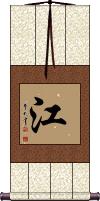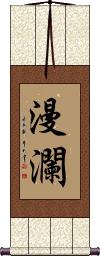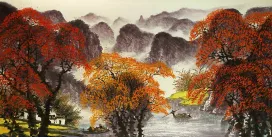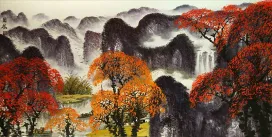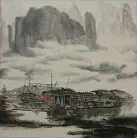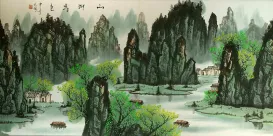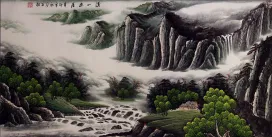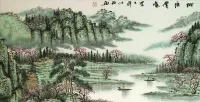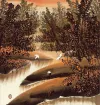Many custom options...
And formats...

Large River in Chinese / Japanese...
Buy a Large River calligraphy wall scroll here!
Personalize your custom “Large River” project by clicking the button next to your favorite “Large River” title below...
Large River
江 means large river in Chinese, Japanese Kanji, and old Korean Hanja. This generally refers to a river big enough that it's navigable by cargo boats, passenger boats, or small ships.
In Japanese, this can be a surname when pronounced as Minkou or just Kou.
No Limitations
漫瀾 is the Chinese, Japanese Kanji, and old Korean Hanja for “Having no boundaries or limitations.”
This literally talks of the vastness of an ocean or river.
Character breakdown:
漫 = free; unrestrained; to inundate; overflowing; boundless.
澜 = swelling water; large wave.
This in-stock artwork might be what you are looking for, and ships right away...
Gallery Price: $400.00
Your Price: $138.88
Gallery Price: $400.00
Your Price: $248.88
Gallery Price: $52.00
Your Price: $28.88
Gallery Price: $52.00
Your Price: $28.88
Gallery Price: $400.00
Your Price: $188.88
Gallery Price: $52.00
Your Price: $28.88
Gallery Price: $52.00
Your Price: $28.88
Gallery Price: $52.00
Your Price: $28.88
Gallery Price: $52.00
Your Price: $28.88
Gallery Price: $400.00
Your Price: $138.88
Gallery Price: $120.00
Your Price: $79.88
Not the results for Large River that you were looking for?
Below are some entries from our dictionary that may match your Large River search...
| Characters If shown, 2nd row is Simp. Chinese |
Pronunciation Romanization |
Simple Dictionary Definition |
江 see styles |
jiāng jiang1 chiang kou / ko こう |
More info & calligraphy: Large River(1) (archaism) large river (esp. the Yangtze); (2) (archaism) (See 琵琶湖) Lake Biwa; (given name) Minkou A river; the River, the Yangtsze. |
麋 see styles |
mí mi2 mi oojika おおじか |
moose; river bank (1) large deer; (2) moose; elk; red deer |
大河 see styles |
dà hé da4 he2 ta ho taiga たいが |
large river (esp the Yellow River) (See 大川) large river; (surname, female given name) Taiga great river |
江上 see styles |
koujou / kojo こうじょう |
(on the) bank of a large river; (personal name) Enokami |
江村 see styles |
kouson / koson こうそん |
village along a (large) river; (surname) Kōmura |
江河 see styles |
jiāng hé jiang1 he2 chiang ho kouga / koga こうが |
river Yangtze and Yellow rivers; large river; (surname) Egawa great river(s) |
茶船 see styles |
chabune ちゃぶね |
(1) (See 瀬取り船) small boat used for transport on rivers (Edo period); barge; boat used for unloading goods from a large anchored boat; (2) boat with a roof used for boating on a river; (3) (archaism) small boat selling food and drinks on a river; (surname) Chabune |
千島湖 千岛湖 see styles |
qiān dǎo hú qian1 dao3 hu2 ch`ien tao hu chien tao hu chishimako ちしまこ |
Qiandao Lake in Zhejiang, aka Xin'an River Reservoir, created as part of a large hydroelectric project in 1959 (place-name) Chishimako |
呾羅斯 呾罗斯 see styles |
dá luó sī da2 luo2 si1 ta lo ssu Tarashi |
Talas, or Taras; '(1) an ancient city in Turkestan 150 li west of Ming bulak (according to Xuanzang). (2) A river which rises on the mountains west of Lake Issikoul and flows into a large lake to the north-west.' Eitel. |
建三江 see styles |
jiàn sān jiāng jian4 san1 jiang1 chien san chiang |
Jiansanjiang, large-scale agricultural development in Sanjiang river plain in Heilongjiang |
The following table may be helpful for those studying Chinese or Japanese...
| Title | Characters | Romaji (Romanized Japanese) | Various forms of Romanized Chinese | |
| Large River | 江 | kou / ko | jiāng / jiang1 / jiang | chiang |
| No Limitations | 漫瀾 漫澜 | man ran / manran | màn lán / man4 lan2 / man lan / manlan | |
| In some entries above you will see that characters have different versions above and below a line. In these cases, the characters above the line are Traditional Chinese, while the ones below are Simplified Chinese. | ||||
Successful Chinese Character and Japanese Kanji calligraphy searches within the last few hours...
